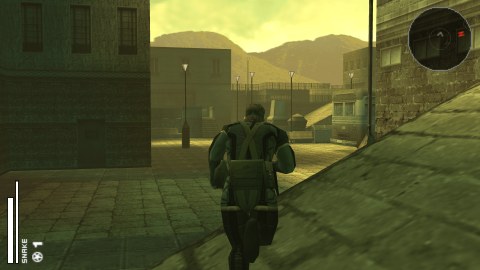- Metal Gear
- Snake’s Revenge
- Metal Gear 2: Solid Snake
- Metal Gear Solid
- Metal Gear Solid Integral Staff Commentary
- Metal Gear Solid (Game Boy Color)
- Metal Gear Solid 2: Sons of Liberty
- Document of Metal Gear Solid 2, The
- Metal Gear Solid: The Twin Snakes
- Metal Gear Solid 3: Snake Eater
- Metal Gear Solid 4: Guns of the Patriots
- Metal Gear Solid: Portable Ops
- Metal Gear Solid: Peace Walker
- Metal Gear Solid V: Ground Zeroes
- Metal Gear Solid V: The Phantom Pain
- Metal Gear Rising: Revengeance
- Metal Gear Touch
- Metal Gear Acid
- Metal Gear Acid 2
- Metal Gear Solid Mobile
After the unique card-based experience of the two Metal Gear Acid games comes a more familiar looking entry of Metal Gear on the PlayStation Portable in 2006. Metal Gear Solid: Portable Ops was designed for the ground up to be a portable experience, if the name didn’t give it away, and its experiments in handheld play ended up becoming the first taste of how the series would move forward with new hardware. The game is overshadowed by its superior sequel, but that makes Portable Ops an important, if shaky, first step toward something new in the hallowed series.
It is 1974 and Big Boss is once again pitted between his loyalties to country and his ideals as a soldier. Naked Snake wakes up in a cell on the San Hironamo Peninsula in Columbia, being tortured for information he can’t remember. With the help of a young Roy Campbell, he breaks out and sets out to figure out how he got in this mess, all while building a network of soldiers and spies to help gain information and resources. His enemy in this one is Gene, a super soldier with a silver tongue able to draw the loyalties of men with an almost hypnotic-like suggestion. Gene’s inner circle includes twins with ESP, Null dubbed the Perfect Soldier, and Cunningham. This is the first time, canonically, where the series’ titular mech is fought, and some story beats do a strong job of reinforcing Big Boss’ later decision, giving it a more consequential angle than its quasi-canonical status implies.
Similar to the first portable entry Ghost Babel, Portable Ops takes place across discrete missions, instead of one connected place like the console entries. Unlike the Game Boy game, however, players have choices on what mission to take. It also introduced co-op gameplay, tackling missions with other players using the PSP’s ad-hoc Wi-Fi connection, as well as competitive modes borrowed from Metal Gear Solid 3‘s online mode. While Peace Walker would introduce a fully cooperative campaign, Portable Ops introduced the idea of co-op to the largely single player series.
The developers were able to manage to fit much of Snake’s move set from MGS3, but some small, key things are missing. The distinct Weapon & Item slots seen in earlier games are gone, leaving only four slots to store things in the field. Other soldiers can be brought into the field and used alongside Snake, hiding in a cardboard box until the player switches to them. Players can customize the load outs for these soldiers, and they have their own unique stats. New soldiers are recruited by dragging them back to a truck on each stage for extraction. Eventually, after a sit in the brig, they can be assigned to different parts of Snake’s force. Spies are placed on specific stages and covertly gather intelligence, and soldiers can be staffed onto medical or cooking duties.
However, in practice, Portable Ops stumbles with these new ideas. Dragging enemies across the stage quickly becomes a chore, especially with the soldiers in Portable Ops having some of the sharpest eyes in the series. The interface for sorting and equipping soldiers is clunky, with lots of fiddling through menus. The game is often vague about mission requirements, and with Snake’s inventory being small, it can be easy to forget a necessary explosive or tool to progress. The real kicker is that boss fights, usually shining examples of the series’ creative design, are underwhelming. All four amount to deathmatches by attrition, with opponents having overdeveloped, rote patterns with far too much invincibility and evasion built into them. Portable Ops is a rough draft for what would become Peace Walker, with a more streamlined interface for organizing soldiers, more interesting boss fights, and the wacky Fulton recovery system to nab new recruits.
Portable Ops looks very much like the Acid games, with models and textures roughly equivalent. Oddly, on real hardware, it’s locked below 30fps, and feels choppy to play. Emulation greatly helps in this regard, with the advent of easily accessible codes to help it run with more stability and smoothness, albeit with some physics silliness. While performance is iffy, the look retains much of the aesthetic of the series, thanks to the PSP’s horsepower. The settings Snake skulks through – prisons, supply bases, secret labs – are well detailed enough, if a little bit bog standard at this point for the series. The game is overly chatty, not an unusual thing for the series. However, the writing feels droll, lacking the flare that Metal Gear is known for. Voice performances are reserved for the wonderful comic book cutscenes illustrated by Ashley Wood, while CODEC & other sequences go without, making them feel barren. In the same way, the music in the game largely doesn’t grab the ears, being a team effort from seven folks, including long time series collaborators like Norihiko Hibino, Takahiro Izutani, and Nobuko Toda. The vocal theme, “Calling to the Night”, however wouldn’t be forgotten, showing up in MGS4, Peace Walker, and Super Smash Bros Ultimate.
About a year later, Portable Ops Plus was released, acting as an expansion pack for the multiplayer side of the game. New maps, mostly drawn from MGS3‘s Online component, were added in addition to all of the earlier levels and save data from the earlier one transfers over, bringing your soldiers with you. The narrative is done away with and the only single player mode, Infinity mode, involves playing through a series of randomized stages, nabbing soldiers and finding level exit. Instead of the exit being marked on the map, the player has to use the radar to track down the faint sound it makes, in a little bit of an added twist on the original gameplay.
Portable Ops and its expansion are both a solid effort, translating the essence of the series to a portable format, like Ghost Babel before it. It is markedly hard to recommend now, however, with Peace Walker taking what it did and expanding upon it in just about every positive way imaginable, and its canonical importance can be summed up in a couple of sentences. In that way, the speed of iterating on a good idea and making it great was still at an all time high for the series.


